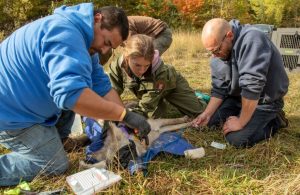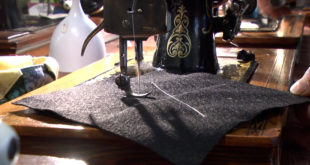HOUGHTON, MICH- The National Park Service announced today that the fall phase of the first year of its Isle Royale wolf translocation project has been brought to a successful close with four wolves translocated to the island from Minnesota. Though the original goal called for two additional wolves from Michigan to be relocated this year, cold weather, extensive rain, and snow showers made it necessary to end trapping efforts.
 “Animal welfare is the primary concern,” said Isle Royale National Park Superintendent, Phyllis Green. “The continued cold weather, which created safety issues for trapping, and high winds and waves in the marine forecast which created additional issues for transportation, led to the decision to end this phase of the project a little early. The park and its partners in this project are already looking at the next phases of the translocation process, which may include relocating wolves from Canada this winter.”
“Animal welfare is the primary concern,” said Isle Royale National Park Superintendent, Phyllis Green. “The continued cold weather, which created safety issues for trapping, and high winds and waves in the marine forecast which created additional issues for transportation, led to the decision to end this phase of the project a little early. The park and its partners in this project are already looking at the next phases of the translocation process, which may include relocating wolves from Canada this winter.”
This three- to five- year effort will relocate up to 30 wolves of a certain age range evenly split between males and females to the isolated island park. Researchers recommend translocating this number of wolves to establish adequate genetic variability and to help accomplish the overall goal of restoring predation as a key part of the island ecosystem. The goal for the first phase of this multi-year project was to translocate up to six wolves from the Minnesota and Michigan mainland to the park this fall.
The fall operation ended with four wolves relocated to the park: one male and three females. Their addition brings the island wolf population to six, which includes two animals on the island from a remnant population. An additional four animals could be brought to the island this winter from Canada. Isle Royale National Park Chief of Natural Resources and Translocation Project Manager, Mark Romanski said, “All of the wolves are moving about and exploring the island, as evidenced by GPS collar data. We will continue monitoring their movements to determine if they form any new packs.”
Green and Romanski agree that the success of this first phase of implementation was due to the project partners’ professional experience and knowledge of local wolf packs. “The Grand Portage Band of Lake Superior Chippewa worked closely with U.S. Department of Agriculture’s Wildlife Services to ensure all four wolves were from different packs and that trapping operations were successful,” said Green.
Sixteen different wolves were captured on the Grand Portage Chippewa reservation during the trapping cycle. Seven of those wolves were collared and released either on Isle Royale or at the site of capture. Young wolves were ear tagged and released. Collaring and ear tagging contribute to the Grand Portage Band’s on-going monitoring program. Ear tags have been invaluable in determining age of wolves for the Isle Royale project and in population estimates on the mainland.
The US Fish and Wildlife Service provided an airplane and pilots for the project and worked carefully within narrow weather windows to move wolves to the island safely. Even though the weather precluded relocating wolves from Michigan this fall, the Michigan Department of Natural Resources and USDA Wildlife Services were ready in Michigan to support the effort and had coordinated many activities that will ensure success next year. “We thank all of our partners and look forward to working with them to complete the relocation project over the next three to five years,” Green said.
Partners on this project: Grand Portage Band of Lake Superior Chippewa, Michigan Department of Natural Resources, Minnesota Department of Natural Resources, US Fish and Wildlife Service, US Department of Agriculture Wildlife Services, US Geological Survey, University of Minnesota and multiple National Park Service units and offices.
 Keweenaw Report Your Source for Local News and Sports
Keweenaw Report Your Source for Local News and Sports





